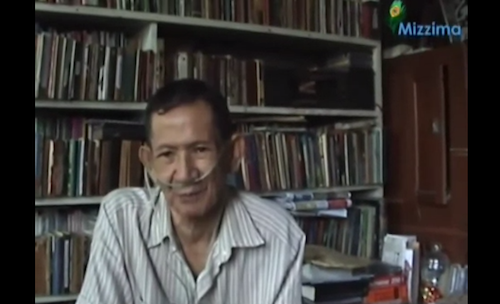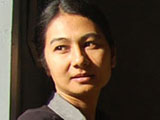Eulogy for Journalist Ludu Sein Win
by Khet Mar / June 28, 2012 / No comments
“Unbelievably, while he was ill he wrote two articles every day. There was no day he didn’t write.”

Ludu Sein Win, 2009. Photo from youtube user mizzimanewsTV.
Sometimes coincidence can astonish you. Last week I started a profile about the journalist Ludu Sein Win; the next day, my editor at Radio Free Asia told me that he had passed away. I suddenly felt crippled. Ludu Sein Win is already dead? Am I dreaming? The piece of paper on which I had written about him was still in my bag. I had planned to call him that day.

- In Burma if you want to hear about issues the newspapers can’t talk about, you should go to a tea shop. Tea houses were where I used to meet with other activists, writers and artists, as well as where I built friendships. Within tea houses we talked about Burmese writers, literary trends we noticed, and, of course, politics. This online space attempts to emulate the conversations I enjoyed in Rangoon’s tea houses.

- Khet Mar is a journalist, novelist, short story writer, poet, and essayist from Burma. She is the author of one novel, Wild Snowy Night, as well as several collections of short stories, essays and poems. Her work has been translated into English and Japanese, been broadcast on radio, and made into a film. She is a former writer-in-residence at City of Asylum/Pittsburgh.
He usually woke up early and I was sure he would be at his desk if I called him that morning. I was looking forward to hearing his peaceful voice.
In 2006 I was invited to submit an application to attend the Women Leadership Program in the United States. At the time, I had no experience with foreign travel and my language skills were weak, so I withdrew my application. When I explained this to Ludu Sein Win, he smiled and listened but then severely criticized me:
“I want young people, writers, and journalists from our country to gain experience from foreign travel, and share their experiences whenever they get the opportunity. I urge ambassadors, foreigners, and people from relevant unions to invite our people whenever I meet them. Now, my urging has been wasted because you are timid, even though they invited you.”
Ludu Sein Win consistently encouraged others, even though he was chronically ill and at the end he needed an oxygen mask. In 1967 he was imprisoned for 13 years due to his work as a journalist. He rarely discussed his time at the interrogation camps, but I know that he was seriously tortured and was once hung upside down and beaten for many hours. As a result of the torture, he suffered a heart attack.
A few months after his release from prison in 1980, he also suffered a stroke that paralyzed the right side of his body for the rest of his life. He developed lung disease soon after and was unable to go out.
However, he worked hard to stay up-to-date on what was happening in the world. Unbelievably, while he was ill Ludu Sein Win wrote two articles every day. There was no day he didn’t write.
Still, he once expressed his sadness that, since 2002, I have written more journalistic pieces than creative ones.
“Your hand is for creative writing. Do what you have to do. You are a writer. You should write creative pieces. I really wanted to write creative pieces, but my hand is not for that,” he said. I promised him that I would, but I couldn’t write as many creative pieces as he expected.
Now Ludu Sein Win, who constantly encouraged me, is not on this earth and the promise I made to him haunts me. Because of him, I am thinking of writing more of such pieces. It’s not that I believe he will be pleased with me from the afterlife, it’s just my way of making amends.
Translation: Courtney Wittekind




